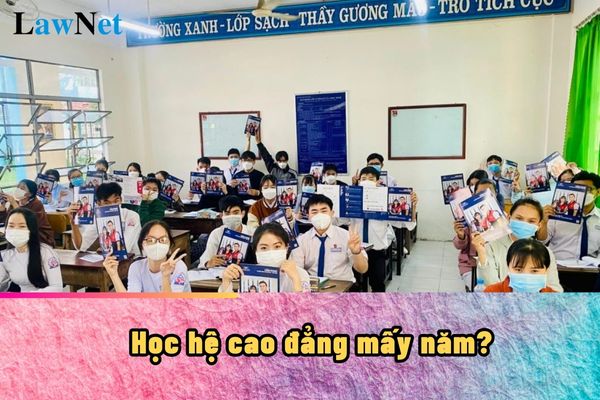What is the duration of College programs in Vietnam? What will the structure of the college training program be like?
What is the duration of College programs in Vietnam?
According to Clause 1, Article 5 of Circular 01/2024/TT-BLDTBXH, regulations on the duration of the course and the study load in the program are as follows:
- The duration of the course for an associate degree program is designed to be from 2 to 3 academic years and must ensure a minimum of 60 credits.
- The duration of the course for a secondary vocational training program is from 1 to 2 academic years, ensuring a minimum of 35 credits for those with a high school diploma, and a minimum of 50 credits for those with a secondary school diploma. The head of the vocational education institution shall prescribe the curriculum content for the additional 15 credits difference for secondary school graduates, ensuring that learners have the basic knowledge to absorb the specialized content of the training field.
- The course duration for learners exempted or credited for previously acquired study results shall be reduced correspondingly to the exempted or credited content.
- The course duration includes learning time and common activity time, where:
Learning time includes: actual study time and time for examinations and tests at the end of subjects, modules; review and graduation exam time for those following a yearly education system. The actual study time is the time students spend in class lectures, experiments, discussions, practice, internships, or integrated learning methods combining theory and practice at practice venues.
Common activity time includes: opening ceremonies, closing ceremonies, mid-term reviews, year-end summaries; summer breaks, holidays, Tet, labor, and reserves.
- The ratio of theoretical study time to practical, internship, and experimental time shall be ensured as follows:
For secondary vocational level: theory accounts for 25%-45%; practice, internship, and experiment account for 55%-75% of the program duration.
For associate degree level: theory accounts for 30%-50%; practice, internship, and experiment account for 50%-70% of the program duration.
- Time for theoretical exams is counted as theoretical hours; time for practical and integrated exams is counted as practical hours.
- The duration of courses for programs in cultural arts, physical education, and sports with specific characteristics shall be regulated by the Government of Vietnam.
Thus, the associate degree program takes from 2 to 3 academic years and must ensure a minimum of 60 credits.
It should be understood that although the time frame is 2-3 years, if a student does not ensure completion of 60 credits, meaning they do not pass certain subjects during their course, they will not meet graduation requirements even after the 3-year period.

What is the duration of College programs in Vietnam? What will the structure of the college training program be like? (Internet image)
What will the structure of the college training program be like?
According to Article 4 of Circular 01/2024/TT-BLDTBXH, the structure of the training program for each field includes:
- Name of the training field;
- Field code (for fields listed in the catalogue);
- Training level;
- Admission target;
- Duration of the course (academic years);
- Total study load (hours, credits);
- Program introduction/description of the training field;
- Training objectives;
- Summary of competencies of the field in the training program;
- List and duration of subjects, modules (mandatory, elective);
- Detailed program of subjects, modules (mandatory, elective);
- Guidelines for using the program.
What are the requirements for the College Programs in Vietnam?
According to Article 3 of Circular 01/2024/TT-BLDTBXH, the requirements for the associate degree training program are prescribed as follows:
- The training program must meet the minimum credit requirements and competency requirements that learners achieve upon graduation for each field and training level.
- For fields that do not yet have prescribed minimum credit requirements or competency requirements upon graduation, it must meet the regulations in Circular 12/2017/TT-BLDTBXH dated April 20, 2017, by the Minister of Labor – Invalids and Social Affairs, and Circular 04/2023/TT-BLDTBXH dated June 15, 2023, amending and supplementing some clauses of Circular 12/2017/TT-BLDTBXH.
- The program must clearly define the list and duration of each subject, module in the training program; theoretical study time, practical and internship time, and end-of-subject/module examination time.
- The content and duration of common subjects in the training program shall be implemented as per the regulations of the Minister of Labor – Invalids and Social Affairs.
- The training program must ensure scientific, logical, systematic, practical, appropriate, and flexible nature; adapt to the diversity in training organization methods. The specialized content must meet the key, core competencies of the profession; supplementary, elective, and advanced competencies options should be provided for learners to choose according to their needs.
- The program must specify the methods of evaluating study results appropriate to the training organization methods, determining the extent to which learners meet the competency requirements after completing the subjects/modules in the training program.
- The training program content must meet the evolving requirements of science, technology, production, business, and service demands; it should meet the needs of enterprises and the labor market, corresponding to the socio-economic development requirements of sectors, localities, and the nation.
- It must ensure modernity and international integration, aiming to align with advanced training standards of developed nations globally; focus on green training and digital transformation objectives.
- It must ensure synchronization with the training levels in vocational education and other educational levels in the national education system.
- The program must clearly define conditions for organizing its implementation and ensure the quality conditions of the training.

